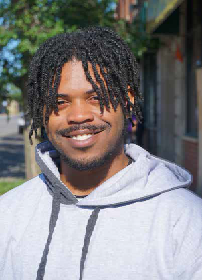A father’s responsibilities are including but not limited to, being a pillar in the development of a child, to support emotional well-being, to discipline and to teach, to love and to care, to protect, to lead and to secure their families.
We have all been blessed with the chance to be sons
and daughters in this world, and some of us are privileged enough to have had relationships with parents, guardians, or parental figures. At times, youth has been caught between the disagreements of parents or mentors with contrasting views. Whether it is one simple argument, constant bickering, separation or divorce or even domestic
violence. From a child’s perspective, who only loosely
grasps the concepts of right or wrong and good or bad, they have no clue who to side with in a given situation. A son loves both his father and his mother unconditionally. Growing up it’s easy to be oblivious to certain situations especially when you are told that your parents are always right. Only until you get older do you realize that it was possible for them to be wrong.

From a son’s perspective, his father is infallible, he can do no wrong, as long as love exists in the relationship. A father could be angry, overprotective, even abusive, but he is still one’s father, which everyone only has one. A father could be in a happy, wealthy, and secure household and that’s their normal, that’s what those particular children
know. Even a couple that keeps up the appearance of perfect harmony in their household, a child can grow up and find faults in that upbringing. It is with age a person acquires a greater understanding of life, and with hindsight is 20/20 they can look back upon and analyze their pasts.
Whether it is revisiting the memory of your parent’s relationship, reconsidering what healthy relationships should look like. For those who were caught between their parents as a youth, can now look back as they get older and realize the past more accurately. Though as much as we learn in life and apply it to our pasts we can’t change it. We must accept each situation an individual goes through to be unique and not compatible with everyone else’s.
As a person gets older and gains new life experiences, we may learn a lesson that we had already been taught before. Even though we had been taught this lesson before we didn’t understand it fully, even if we thought we did. Now, with new information, past lessons begin to become more clear and make more sense. This is applicable to many teachings, but especially those from our parents and mentors. It is easy for a child to come off as unappreciative in the moment.
But that can be explained by their youthful innocence. Being shielded from adverse and uncomfortable situations by parents or teachers and the school can lead a child to believe life is all given to them and they are entitled to it. But being limited in a sense, having a balance is what taught me, and can teach other children to be humble, to be considerate, and to be appreciative.
But again those are attributes gained with age and understanding of the real world. When you leave your local community and see more well-developed, well taken care of, cleaner communities and you realize that not everyone has an equal opportunity in life.
You realize that some people had to work harder than others. You grow up and see foreign countries in conflict, see war, and death of masses. You realize that this life isn’t easy and that your parents have been protecting you from it all. You become thankful to even have parents because you learn that not everyone does. You see the racial division in the world and realize you’re different, that we are excluded. but you’re thankful because your parents always included you.
Even if your parents are separated or divorced you appreciate them because they loved you and they worked for you. But this appreciation rarely happens at the moment. No, it almost always in hindsight or overall in retrospect
When envisioning children, most always see them as
happy. Laughter, play, and smiling faces are how we see children. How can they all be happy even in single-parent homes, low-income households, abusive relationships, or any other adverse situations?
It’s because children don’t focus on sadness or anger, they can feel it, but they choose
not to focus on it. In a dilapidated home with no hot water or electricity, a child can just be happy to have toys. As a child you want nothing more than to make your parents proud, this is especially true for Father and Son or Father and Daughter relationships. No one wants to disappoint their dad, which is perhaps why young children often seek out attention. They don’t realize the stress that comes with living, having to pay bills, and supporting a child, the pressure
their parents are carrying.
It won’t be until we, the children of past generations, become parents ourselves will all of the lessons we’ve been taught be fully understood. Sometimes even as grandparents we still learn and realize new perspectives of old lessons. As a young person who has gained the first level of understanding and appreciation for those elders who supported them, one must continually pay it forward to those younger who are watching and learning from them. Siblings, cousins, peers, local youth all look to the young man to see their next steps. As older siblings, we have a responsibility to the younger ones to teach them, advise them and guide them through things we have already experienced.
The older a man gets, the more he values everything his father taught him. And we realize how alike to our fathers we really are. Even those who work the hardest to be different from their parents often end up like them anyway. A father is his son’s first and most important role model.
African American men have been stereotyped and portrayed as absent fathers, and that unfortunate stigma is true far too often. But no one group can be generalized absolutely, for there are many examples where this is not true for black fathers. As African American men in America we must always be vigilant and actively operate in opposition to these stereotypes forced upon us.
Having a father in one’s life can help prepare young men for these adversities that they are bound to be met within society. A present father who doesn’t “fit the profile” of the stereotypical absent black father, is the driving force toward changing the narrative. Being present for one’s son will show them that all the other stereotypes and stigmas that they will be labeled within life are not true. And they know this because the stereotype of them being fatherless was not true, either.






